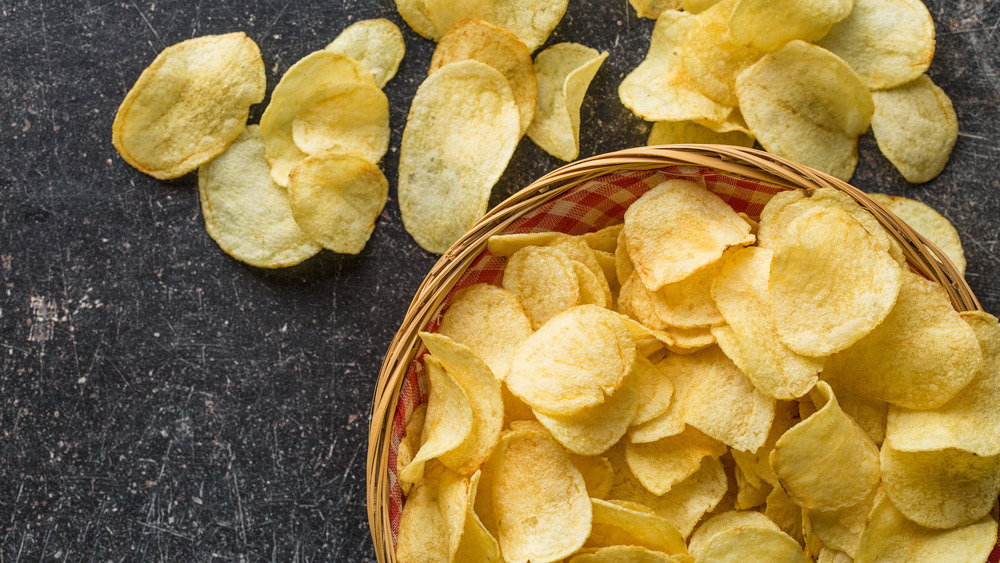The Reason It's So Hard To Stop Eating Potato Chips
Lay's — the brand that's synonymous with potato chips — got it right back in 1963. Their slogan, "Betcha can't eat just one," is not just catchy but absolutely true. In an experience piece published on Vice, the writer, a self-proclaimed potato chips-addict, confessed to ghosting on friends to be with a bag of chips instead. The humor of it is lost when we learn that the 'Queen of all media', Oprah Winfrey herself confessed to battling the addiction in an interview with People magazine. She said that of all her Weight Watchers-related achievements, developing the willpower to resist potato chips was the greatest.
So if you are struggling to put away the bag of chips that's in your hand now, we'd totally understand. It's not you, it's the potato chips. The carbs and fat in them increase your tendency to snack more even if you are not hungry. There is even a biological term for it: hedonic hyperphagia. We all have experienced it, but a study published in Frontiers in Psychology has proved it in rodents. When rats (which were not hungry, by the way) were introduced to four different kinds of foods: fats, carbohydrates, a mixture of fat and carbs, and potato chips, many went for the fat and carbs food, but most walked right to the potato chip.
What this meant is that besides fat and carbs there was something else in potato chips that made them want it. That something, as it turns out, is salt (via The Healthy).
The salt in potato chips make them as addictive as hard drugs
Dr. Tony Goldstone, faculty of Medicine, Department of Brain Sciences, at Imperial College London, and author of Secrets of Our Favorite Snacks, as part of a study, showed overweight volunteers pictures of potato chips and junk food, and substance abusers, pictures of drugs and booze, and observed their brain scans (via Metro). In both cases, the same areas of the brain were affected.
What this means is that your craving for salt is not different from the craving for opiates (via Science Daily). A team of Duke University Medical Center and Australian scientists took a hard look at what happens in the hypothalamus — a region of the brain that is responsible for keeping the salt and water content in balance, maintaining the blood pressure, heart rate, and so on — when mice craved salt.
They induced stress hormones (this increased the need for salt) in mice and withheld salt from them. When the mice craved salt, a certain region in the hypothalamus became receptive to dopamine, a chemical that induces the feeling of pleasure (via Psychology Today), and is, as the Science Daily report puts it, "the brain's internal currency for reward." Eating salt triggered the release of this chemical. So whenever the mice finally consumed the salt, what they were left with was a feeling of reward, gratification, and a craving for more.
Potato chips give you an energy spike
With salt in the spotlight, many tend to overlook the sugar that sits camouflaged as starch in the potato. It is, in fact, absorbed more quickly than actual sugar of a similar amount, according to Eric Rimm, an associate professor of epidemiology and nutrition, Harvard School of Public Health. Rimm told The New York Times Magazine that the starch in the potato causes the glucose levels in the blood to rise. And just as rapid is the rise, so is the fall of the glucose level, thereby making you want one more chip. And then some more. (via HuffPost)
But isn't it strange that you never feel full eating a bag of chips? Food scientist Steven A Witherly did a study of the Doritos Classic Nacho Cheese and found a reason for that. The chip is so rich in fat that take a bite of it, and it melts in your mouth. This tricks your brain into believing that the calories have vanished too. It's called the 'vanishing calorie density' (via New York Post). There is also a reason why you never get sick of it. The flavors, Witherly found, have been mixed in a way that no one particular taste stands out. This way, the chips are engineered to avoid 'sensory specific satiety' that happens when you feel full because of a dominant flavor in food.
The crunchiness makes you want more of it
The louder the crunch of a potato chip, the greater is its desirability. A team of researchers — Massimiliano Zampini of the University of Trento in Italy and Charles Spence of Oxford University in the UK — found that the crunching sound of the potato chip in your mouth matters more than you think.
They invited 20 participants to their research lab and asked them to bite into Pringles chips, one by one, in front of a microphone. Each participant was asked to wear a headphone into which the research team fed the crunching sound after modifying it electronically to make some sound louder than the other (via The New Yorker). What they found was that louder crunching prompted participants to perceive the chips as fresher and crispier and therefore more enticing, per Eat This, Not That.
For this research, the duo bagged the 2008 Ig Nobel Prize — an award organized by the scientific humor magazine Annals of Improbable Research, while the rest of us sat wondering if we should learn to chew silently to not binge eat. But that wouldn't help either. It's just enough to see a particular chips bag labeled as 'crunchy' for us to consume it more, says a 2019 study published in Appetite.



